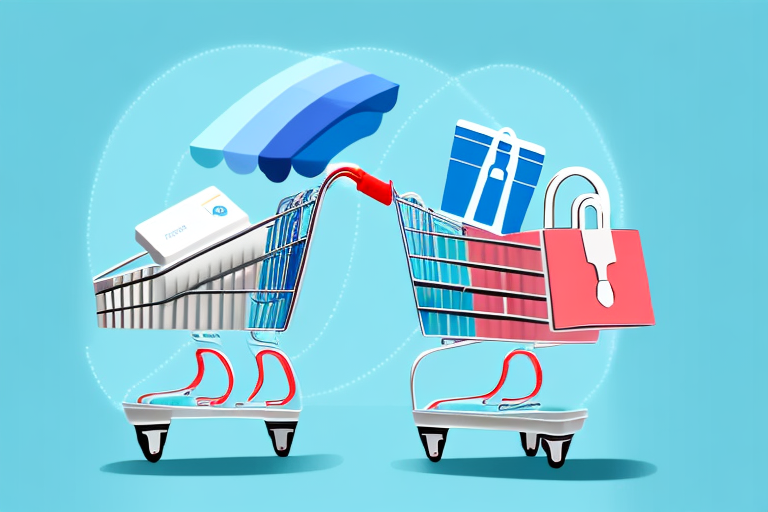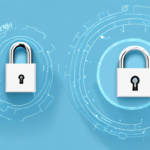Securing Your E-Commerce Business: Tips for Ensuring Online Safety
In today’s digital age, e-commerce businesses face a range of online security threats that can endanger their reputation, customer trust, and bottom line. The good news is that by taking proactive measures to safeguard your business, you can minimize the risk of data breaches, fraud, and cyber attacks. This article covers a wide range of best practices and strategies for securing your e-commerce business and ensuring the safety of your customers’ information.
Why Online Security is Critical for E-Commerce Businesses
Online security is a critical concern for e-commerce businesses, as your website is a primary entry point for cybercriminals to exploit vulnerabilities. With more people relying on digital modes of payment and shopping online, the risk of data breaches and cyber attacks is increasing. According to Forbes, data breaches exposed over 22 billion records in 2021, highlighting the urgent need for robust security measures.
Security breaches can not only lead to financial losses but also damage your reputation as a reliable and trustworthy business. One of the biggest threats to online security is phishing attacks, where cybercriminals trick users into revealing sensitive information such as login credentials or credit card details. These attacks can be carried out through emails, social media, or even fake websites that look like legitimate ones. E-commerce businesses need to educate their customers about these threats and provide them with tools to protect themselves.
Another important aspect of online security is keeping your software and systems up to date. Cybercriminals are constantly looking for vulnerabilities in popular software and platforms, and if you don't update them regularly, you could be leaving your website and customer data exposed. E-commerce businesses should have a robust system in place for monitoring and updating their software, as well as conducting regular security audits to identify and address any potential weaknesses.
Common Online Security Threats Faced by E-Commerce Businesses
E-commerce businesses are vulnerable to various online security threats such as malware attacks, phishing scams, credit card fraud, and hacking. Malware is malicious software that is designed to infect your website or network, causing damage or stealing sensitive data. Phishing is a type of scam where fraudsters impersonate legitimate entities to trick people into revealing their personal information. Credit card fraud includes unauthorized use of credit card information for online transactions. Hacking is the unauthorized access to your website or network with the intention of stealing data, defacement, or other malicious activities.
Another common online security threat faced by e-commerce businesses is ransomware. Ransomware is a type of malware that encrypts your data and demands payment in exchange for the decryption key. This can cause significant damage to your business operations and reputation if sensitive customer data is compromised.
Additionally, e-commerce businesses may also face distributed denial of service (DDoS) attacks. DDoS attacks involve overwhelming your website or network with traffic, causing it to crash and become unavailable to customers. This can result in lost sales and damage to your brand reputation.
How to Secure Your E-Commerce Website: A Step-by-Step Guide
The following are some of the key steps for securing your e-commerce website:
Install Security Software
Make sure your website has reliable security software like antivirus, anti-spam, firewalls, and intrusion detection systems. Keep your software updated to avoid vulnerabilities that can be exploited by hackers.
Use Encrypted Connections
Use an encrypted connection for your website with an SSL/TLS certificate to secure data transmitted between your site and your customers’ browsers.
Create Strong Passwords
Create strong passwords for your website admin panel and database. Use a combination of uppercase and lowercase letters, numbers, and symbols. Use password managers to generate and store strong passwords securely.
Regularly Backup Your Data
Regularly backup your website database and files to minimize data loss in case of a security breach.
Monitor Site Activity
Monitor your website activity regularly using web analytics tools to spot any unusual or suspicious activity.
Implement Two-Factor Authentication
Implement two-factor authentication for your website admin panel and other sensitive areas of your website. This adds an extra layer of security by requiring a second form of authentication, such as a code sent to a mobile device, in addition to a password.
Train Your Employees
Train your employees on best practices for website security, such as how to create strong passwords, how to identify phishing scams, and how to avoid downloading malware. Make sure they understand the importance of website security and their role in maintaining it.
Best Practices for Safe Online Transactions
Online transactions are a crucial component of e-commerce businesses, and safety should be a top priority. Here are some best practices for safe online transactions:
Use a Secure Payment Gateway
Use a secure payment gateway that provides PCI-DSS compliance, 3D secure authentication, and fraud detection mechanisms.
Encrypt Payment Data
Encrypt payment data using SSL/TLS encryption to secure the data when transmitted and stored.
Implement Strong Authentication
Implement strong authentication mechanisms like two-factor authentication to ensure secure access to payment gateways and other critical systems.
Monitor Transactions Regularly
It is important to monitor transactions regularly to detect any suspicious activity. This can be done by setting up alerts for unusual transactions or by reviewing transaction logs on a regular basis. Early detection of fraudulent activity can prevent further damage and minimize losses.
Importance of Regularly Updating Your Website’s Security Software
Regularly updating your website’s security software is critical to securing your business and avoiding vulnerabilities that can be exploited by cybercriminals. Websites that use outdated software are more prone to security breaches, and the longer you go without fixing them, the higher the risk of an attack. Keep your website software up-to-date to ensure the safety of your business.
One of the main reasons why it is important to regularly update your website’s security software is to stay ahead of the latest threats. Cybercriminals are constantly developing new techniques to exploit vulnerabilities in software, and security updates are designed to address these new threats. By keeping your website software up-to-date, you can ensure that you are protected against the latest security risks.
Another reason why it is important to regularly update your website’s security software is to maintain compliance with industry regulations. Many industries have specific security requirements that businesses must adhere to, and failure to comply can result in fines or other penalties. By keeping your website software up-to-date, you can ensure that you are meeting the necessary security standards for your industry.
Strategies for Protecting Customer Data from Cybercriminals
Protecting customer data is a crucial aspect of e-commerce security. Here are some strategies to protect customer data:
Implement Data Encryption
Implement data encryption for protecting sensitive information like names, addresses, phone numbers, and credit card data. Encryption ensures that the data is unreadable to hackers in case of a data breach.
Collect Data Minimally
Collect only the data necessary for the transaction and do not store additional sensitive customer data on your website.
Adhere to Data Security Standards
Adhere to data security standards like PCI-DSS, GDPR, HIPAA, and CCPA to ensure compliance with data protection laws and regulations.
The Role of SSL Certificates in Safe Online Shopping
SSL (Secure Sockets Layer) certificates ensure encrypted communications between the client and server, which is especially important for online shopping. SSL certificates help encrypt sensitive customer data and offer trust and reliability for customers. A secure website is an essential element to ensure trust not only with search engines but also with customers. Ensure your site has an SSL certificate installed to safeguard customer data.
How to Train Your Employees to Identify and Prevent Cyber Attacks
Training employees is a crucial component of e-commerce security. Ensuring that employees are aware of security vulnerabilities, phishing scams, and best practices can minimize the risk of a security breach. Training for employees should include:
Identifying Security Threats
Teach employees to identify potential security threats like phishing scams, suspicious emails, and malware attacks.
Best Practices for Passwords
Employees should use strong passwords and change their passwords frequently. Additionally, staff should not reuse passwords across multiple accounts.
Network Security
Provide information on best practices for keeping data secure when using company networks.
Prevention is Key: Tips for Avoiding Phishing Scams and Other Malware Attacks
Phishing scams and malware attacks are significant security threats for e-commerce businesses. Understanding how to prevent these threats is crucial for online safety. Some tips include:
Verify Email Sources
Train employees to verify email sources before opening an email or clicking on a link. Be cautious regarding any email that prompts the need to enter a password or other credentials.
Updating Software
Ensure all software is up-to-date, as outdated software is an entry point for hackers.
Beware of Unusual Activity
Train employees to watch for unusual activity in browsers and IP addresses.
The Benefits of Using Two-Factor Authentication for Your E-Commerce Site
Two-Factor Authentication (2FA) is an extra security layer that adds an additional step for users to gain access to their accounts. Implementing 2FA offers greater security and requires users to submit additional authentication after entering their user ID and password. This can include fingerprint recognition, retina scans, or SMS code confirmation. Implementing a 2FA system is an effective way for e-commerce businesses to keep their website secure.
What to Do If Your E-Commerce Site is Hacked: Tips for Responding to a Security Breach
In case of a security breach, specific steps should be taken to restore integrity and minimize the damage.
Shut Down Your Site
Immediately shut down your website to prevent further damage from attacks.
Inform Your Customers
Inform your customers of the security breach. Be transparent about the incident, including the impact of the hacks, and corrective measures taken to fix the problem.
Fix the Vulnerabilities
Identify and fix any vulnerabilities that may have led to the breach. Ensure that all necessary software, including all third-party tools, is up-to-date.
Recover Data
If any important data has been lost, attempt to recover it through backups or other means.
The Future of E-Commerce Security: Trends to Watch Out For
As e-commerce continues to grow, cybersecurity risks will continue to evolve. Keeping up with emerging trends is crucial to ensuring your business stays protected. Some trends to watch for in e-commerce security include:
Multilayered Defenses
As attacks become more frequent and sophisticated, multilayered defenses will become essential. Businesses must build a comprehensive security approach that includes multiple protective layers such as network security, application security, and endpoint security.
Artificial Intelligence
Artificial Intelligence (AI) plays a critical role in enhancing e-commerce security. Advancements in both AI and machine learning will continue to help identify and prevent evolving threats before they can cause damage. AI can analyze patterns, detect anomalies, and respond to threats in real-time, making it an invaluable tool in the cybersecurity arsenal.
Top Tools and Resources for Ensuring the Safety of Your Online Business
Due to the seriousness of e-commerce security threats, many resources and tools are available to help businesses stay protected. Check out some of the top online resources for enhancing your e-commerce security:
The PCI Security Council
The PCI Security Council is an excellent resource for all businesses handling customer payment details. The council provides compliance standards and advice on appropriate e-commerce security measures.
Norton Security
Norton Security offers a range of security software specifically designed to enhance e-commerce safety. Their products provide robust measures against browser-based exploits and malware.
Google Transparency Report
Google offers a transparency report on phishing and malware sites which might contain harmful content.
Security Blogs and News Sites
Stay up-to-date on the latest e-commerce security threats by following various cybersecurity blogs and news sources.
Security Experts
Seek the expertise of seasoned security experts. Engage cybersecurity professionals to regularly assess your site’s security and advise on areas for improvement.
With online threats a constant issue, securing your e-commerce website and data is a top priority. Adopting proactive measures and best practices, like those discussed, is critical to maintaining a safe and secure online business. Following the tips outlined in this article will help secure your e-commerce business and will bolster your efforts to keep your customers’ information safe.






















